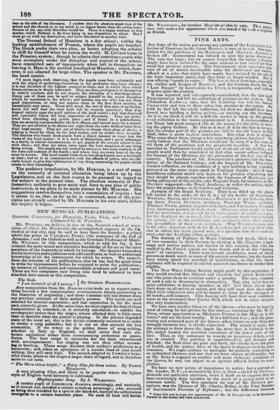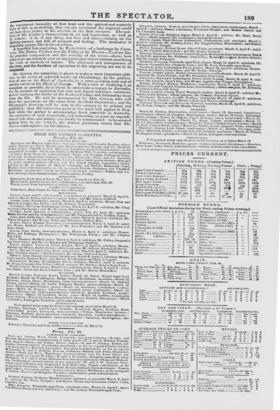FINE ARTS.
Au. hope of the nation possessing any portion of the feswitexce Col. lection of Drawings by the Great Masters, is now at On end. The negs, fj tiation for the purchase of the RAPHAELS and Micuare ANGELOSis broken off: Government has refused to give the price dematslee The sum was large ; but we cannot forget that the entire collection might have been secured for the same amount as was aslred for these small but precious portions. The Government then rejected a trews sure of art of almost inestimable value for choiceness and varlets, offered at a price that might have nearly been realized by the sale Of the least important parts—had they been so frugal.minded. But it was offering "pearls to swine." The loss of these drawings, especially the studies and designs of Reprieve. and the Cartoon heads for de " Last Supper" by LEONARDO DA VINCI, is irreparable, and reflects disgrace upon the country. It was reported, and subsequently contradicted, that the late Lord FARNBOROUGH had left his collection of pictures to the nation. The Cheltenham Looker-6n says, that his Lordship has left his fainoas CANALETTI and two or three other fine pictures to the nation. We wish he had left his whole collection, for then we should have bete forced into building a fitting gddery—or turning out the Academy. As it is, we think it will be a difficult miner to hang up the present small collection in the rooms appropriated to it. A correspondent of the Times last week assigned this as the reason ler the delay in open. ing the pigmy Gallery. Be this as it may, if it he the fact as he says, that the greater part of the pictures arc still in the old house in Pall Mall, there is gross neglect somewhere. But what does it matter? Who cares about them, except a few crotchetty picture-fanciers? We verily believe that the Ministers would not lie sorry if a fire were to rid them of the paintings and the perplexity together. A few fine speeches in Parliament would easily get them out of the hobble; red people would then be astonished to tied what secret ardour inflamed the bosoms of the Ministers for the promotion of the tine arts of the country. The purchase of Mr. ANGERSTEIN'S pictures laid the four.- dation of the National Gallery; and the bequest of Mr. !founts Case's collection, on the condition of a new building being provided, procured us the stone cruet-stand in Trafalgar Square : noiv if some munificent collector would only leave us his pictures stipulating that they should be placed, together with the Cartoons of RAPHAEL, ins fitting gallery out of the smoke—the Regent's Park, for instance, as Mr. HAYDON suggested—the Royal Academy, or rather the artists, might have the pepper-boxes to themselves and welcome. Apropos of the Royal Academy. They have filled up the places left vacant in the ranks of the R. A.s by the deaths of SToiliAne, WESTALL, SOANE, and CoNSTABLE—DANIELL'S is yet left—by elect- ing JOHN PETER. DEERING, arehitea, WILLIAM \YVON, Pledallist, Ttiosins UwiNs, painter of poetical designs, and nivoiniier; 1. it:11Am) Lin:, landscape painter, in their St(2:1:1. %OM 011:411t l0 hate bad the preference, was pa-‘sed by in l'011,2:11lenra of a late /;: rose pas; for the Academy arc so inin%.1, that :hi— serutinize most imim.itoriany the private life of the candidates, and resolutely dose their eyes to the peccadilloes of their own inembors. Why ‘'friiintiN(i.roN, is the elder Associate of both the R. A.a elect, and no way their infe- rior in talent, hiss been passed over, is a question that we cannot an- swer—nor the Academy either, perhaps. The Society of Painters in Water Colours, last week, filled one of two vacancies in their Society, by electing a Mr. CALLOw, a land- scape and marine painter, not known in this country, hut who has studied in the French school, we have heard, and is of the "dashing style" of execution. There were several candidates, most of whom possess as much merit as many of the present members; but the Society have wisely raised the standard of qualification, so that the future aspirants will be required to exhibit matured excellence to render them eligible. The New Water Colour Society might profit by this regulation, if they would rescind that illiberal and impolitic law which hinds every one who joins them to continue under it penalty. The very existence of such a rule is disparaging to themselves. Nay, why need they re- quire exhibitors to become members at all? Let them throw open their doors to all artists of talent, and they will soon find their ranks filled with volunteers who will be bound to them by the strongest of all bonds—self-interest. This Society will have their next exhibition more to the westward than Exeter Dell, which was in other respects' also very inconvenient. We have seen another likeness of the Queen—who must be heartily tired of sitting for her picture by this time—a miniature by Mr. IV. C Ross, whose appointment as Miniature Painter to her Majesty is the latest,* and not the least worthy. It is a full front feed ; and the pene- trating and animated gaze of the Queen, when intent on any thing that strongly interests her, is vividly expressed. The mouth is open ; but the attempt to draw down the tipper lip, more than is habitual in the life, rather lessens the sensitive sweetness of the lower part of the fuce. Thus, in the endeavour to remedy an imaginary defect, a real one is created. The painting is exquisite—free, yet delicate and finished : the flesh tints are pure and fresh, the cheeks have the glow of health, and the mature form of the figure is characterized by juve- nescence. We ought perhaps to apologize for publicly remarkieg on an unfinished likeness, and one that we were shown accidentally; but as Mr. Ross is engaged on another and more eluborate miniature of the Queen, he may not object to an opinion offered before its com• pletion. We have no new 'prints of importance to notice ; but a portrait of Mr. Leader, M.P.—a mezzotint by LUCAS, from a sketch by Dupre— demands our particular attention, since it leads us to suppose that we have unwittingly done injustice to the merit of a young artist of no common talent. The first specimen we saw of Mr. DUPPA'S par. trsiture, was the likeness of Mr. Charles Buller, in the First Number Of SAUNDERS'S Portraits of Reformers ; but the difference between • Since this was In type, the appointment of !dr. II. COLLIN also to be Ilinia143 Painter to the Queen has been announced.
tconstrained formality of that head and the spirited and masterly style of this, is so striking, that we are convinced the engraver could
the have done justice to his original in the first instance. The por- trait of Mr. Leader is characteristic in air and 'expression, as well as in feature : it is, if any thing, too free and loose-verging on the dashing manner, but full of purpose and feeling. The mezzotint is singularly painter-like in its execution. A beautiful line engraving, by R A DuLYPFE, of a landscape by CaEs. SICK, The Dutton Viaduct over the Valley of the Weaver-CLAuDElike for graceful composition and the serenity of the scene-shows how refined art can triumph over an unpicturesque object without sacrificing the truth or modesty of nature. The clearness and transparency of the tints, and the freedom of execution in the engraving, are not to be surpassed. air. Goetz', the naturalist, is about to make a most important addi- tion to his series of splendid works on Ornithology, by the publics. tion of one on the Birds of Australia, in a corres-ponding style and of similar extent to bis Birds of Europe. With a view of rendering it as complete as possible, he is about to undertake a voyage to Australia, for the purpose of exploring that vast and almost unknown continent, and of studying the habits of the feathered tribes and delineating them from the life. lie will be accompanied by Mrs. GOULD, who will draw the specimens on the stone from the birds themselves ; and the lithographic drawings will be sent to this country to be printed and published : thus the successive parts of the work will appear in Eng. land while the author is accumulating fresh materials in Australia. An enterprise of such magnitude, and demanding so great an expendi. ture of toil, time, and money, can hardly be remunerated : to be secured against loss, is, we believe, the utmost pecuniary return that Mr. GOULD contemplates for his labours.



























 Previous page
Previous page